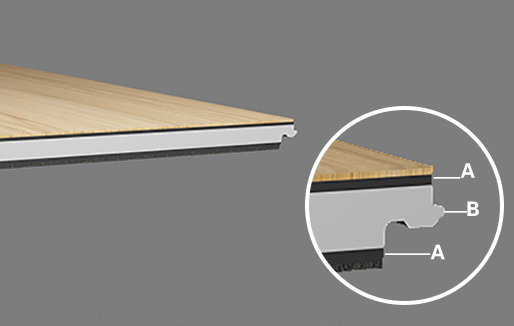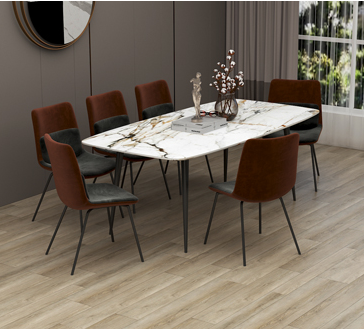
If you've been shopping for flooring lately, or even if you're in the flooring industry, you've probably noticed the influx of vinyl flooring options that have come onto the market in recent years. To find out the difference between WPC and SPC and how to choose, read below
Price - WPC is usually more expensive than SPC.
Insulation - WPC is better insulated than SPC, which means that SPC flooring can be colder to the touch.
Sound absorption - WPC's thicker core absorbs sound better than SPC.
Stability - SPC is more stable than WPC under temperature changes and high heat.
Feel - The thicker cushion of WPC provides more comfortable underfoot cushioning than SPC.
Durability- The dense core of SPC is less likely to dent than WPC.
The options and possibilities that luxury vinyl flooring offers designers continue to expand thanks to new technologies. One of the latest luxury vinyl products is Hard Core Luxury Vinyl Flooring, a luxury vinyl flooring consisting of a stronger or 'hard' core for added durability. Hard core luxury vinyl flooring is a glue-free format with a click-lock installation system.
The two types of hard core luxury vinyl flooring are Stone Plastic Composite (SPC) and Wood Plastic Composite (WPC). When it comes to SPC versus WPC flooring, it is important to note that while both have various features, the differences between the two should be considered when deciding which type of flooring is best for your space or interior design project.
SPC stands for Stone Plastic (or Polymer) Composites and is characterised by a core usually consisting of approximately 60% calcium carbonate (limestone), polyvinyl chloride and plasticisers.
WPC, on the other hand, stands for wood-plastic (or polymer) composites. Its core usually consists of polyvinyl chloride, calcium carbonate, plasticisers, blowing agents and wood-like or wood-based materials such as wood flour. manufacturers of WPC, originally named after the wood-based materials of which they are composed, are increasingly replacing various wood-based materials with wood-like plasticisers.
WPC and SPC are relatively similar in composition, although SPC consists of much more calcium carbonate (limestone) than WPC, which is where the 'S' in SPC comes from; it has a much more stony composition.
To better understand the similarities and differences between SPC and WPC, it is helpful to look at the following quantifiable qualities Appearance and style, durability and stability, application and cost.
SPC and WPC do not differ much in terms of the designs each offers. Using today's digital printing technology, SPC and WPC tiles and planks can easily be produced visually and texturally to resemble wood, stone, ceramic, marble and unique finishes.
In addition to design options, recent advances have been made in the choice of different formats. both SPC and WPC flooring can be made in a variety of formats, including wider or longer planks and wider tiles. Multiple lengths and widths of both products packaged in the same carton are also becoming a popular option.
Similar to dry-backed luxury vinyl flooring (i.e. the traditional type of luxury vinyl flooring that requires an adhesive to be installed), SPC and WPC flooring is made up of multiple layers of backing fused together. However, unlike dry-backed flooring, both types of flooring have a rigid core and are a much stiffer product.
As the core layer of SPC is made up of limestone, it is denser compared to WPC, although thinner overall. This makes it more durable compared to WPC. Its high density provides better resistance to scratches or dents caused by heavy objects or furniture being placed on it and makes it less prone to swelling in extreme temperature changes.
One thing to note is that although SPC and WPC are often marketed as waterproof, they are in fact water resistant. Although neither is completely waterproof when submerged underwater, localised spillage or dampness should not be a problem if proper cleaning is carried out within a reasonable period of time.

Rigid core products including WPC and SPC were originally created for the commercial market because of their durability. However, homeowners are also beginning to use rigid core for its ease of installation, design options and durability. It is worth noting that some SPC and WPC products vary from commercial use to light commercial use, so it is always best to consult the manufacturer to find out which guarantee applies.
As well as being easy to install click-lock systems, another highlight of SPC and WPC is that they do not require extensive substrate pre-treatment prior to installation. While it is always good practice to install on a flat surface, defects in the floor, such as cracks or dents, are easier to hide thanks to the rigid core component of SPC or WPC flooring.
And, when it comes to comfort, WPC is usually more comfortable underfoot and less dense than SPC due to the foaming agent it usually consists of. Because of this, WPC flooring is particularly suitable for environments where employees or customers are constantly on their feet.
In addition to providing more cushioning when walking, the foam in WPC provides more sound absorption than SPC flooring, although many manufacturers offer an acoustic backing that can be added to SPC. WPC or SPC with an acoustic backing is ideal for environments such as classrooms or office spaces where noise reduction is important.

SPC and WPC flooring are similar in price, but SPC is usually slightly more expensive. When it comes to installation costs, both are generally comparable as neither require the use of adhesives and both can be easily installed with a click-lock system. Ultimately, this helps to reduce installation time and costs.
There is no clear winner in terms of which product is better overall. there are many similarities and some key differences between WPC and SPC. wpc may be more comfortable and quieter underfoot, but SPC is denser. Choosing the right product really depends on what your flooring needs are for a particular project or space.
Overall, SPC is a great, cost-effective option for those who want LVT flooring that can handle major temperature fluctuations and heavy impacts. On the other hand, if you’re looking for LVT flooring with better sound absorption and a comfortable, warm underfoot, then WPC might be worth the additional cost.
If you found this comparison of SPC vs. WPC flooring helpful, you can find more information on our website blog, including posts comparing SPC to other flooring products.
Feel free to contact us to find out more about SPC Flooring. We would love to work with you on your next project.